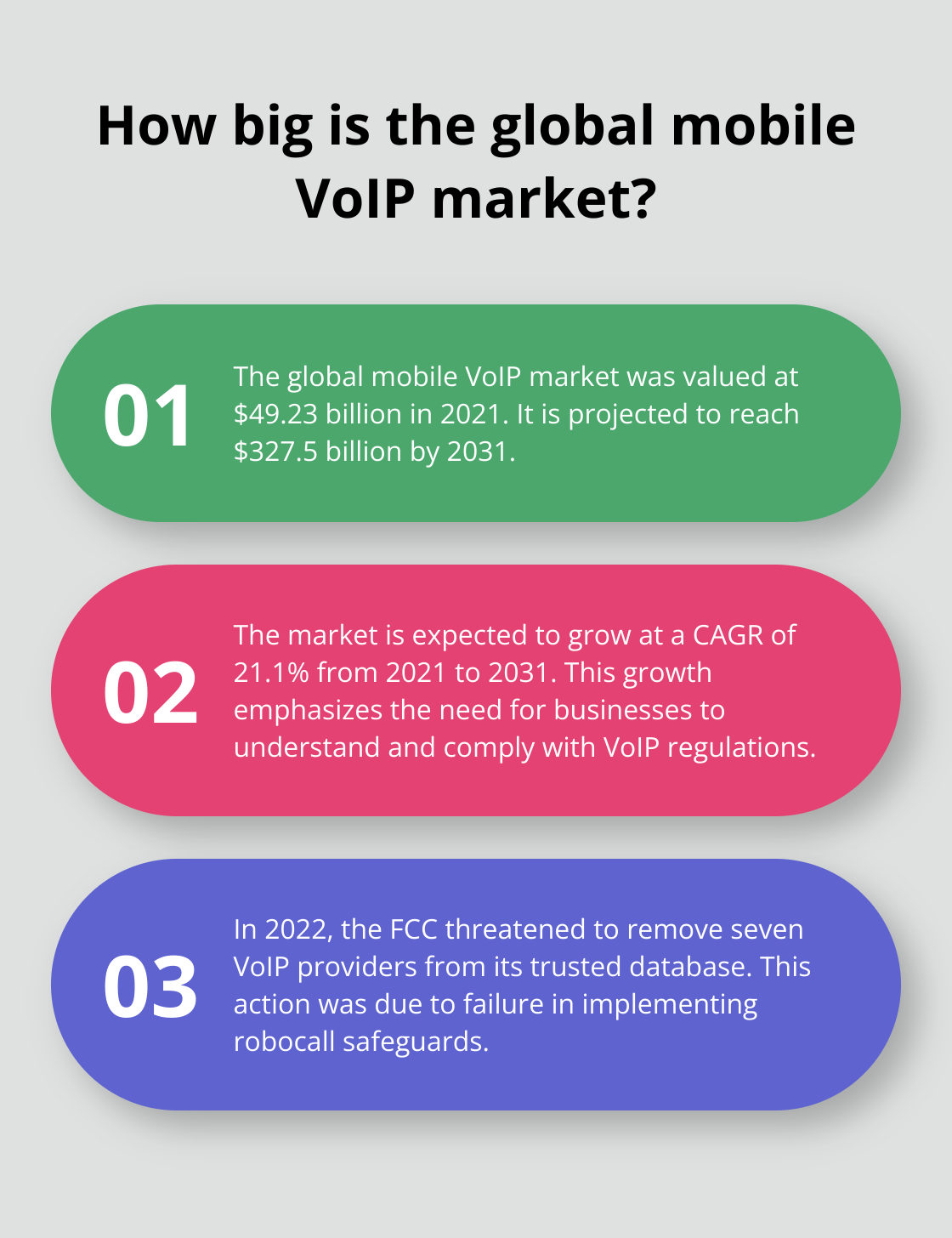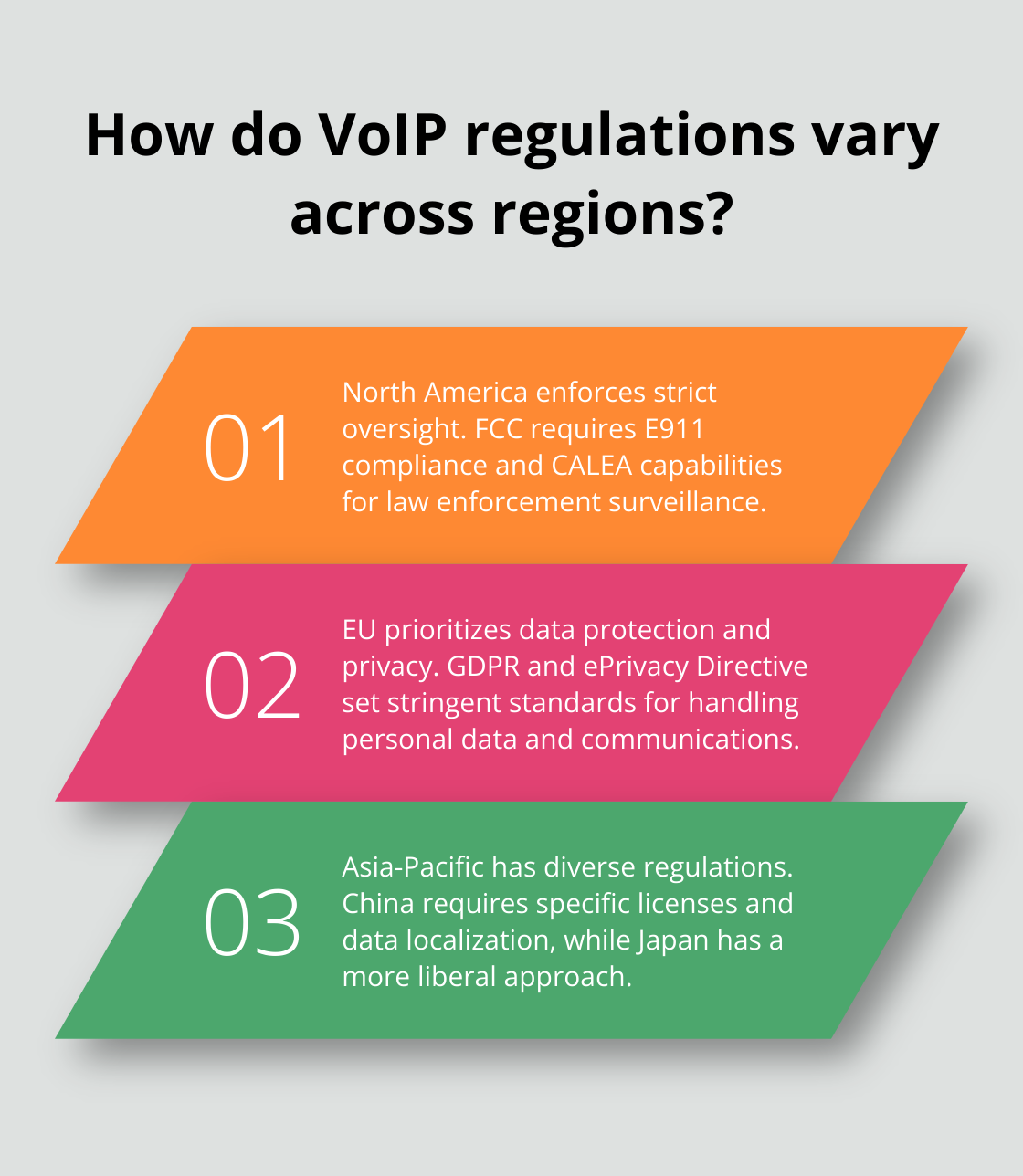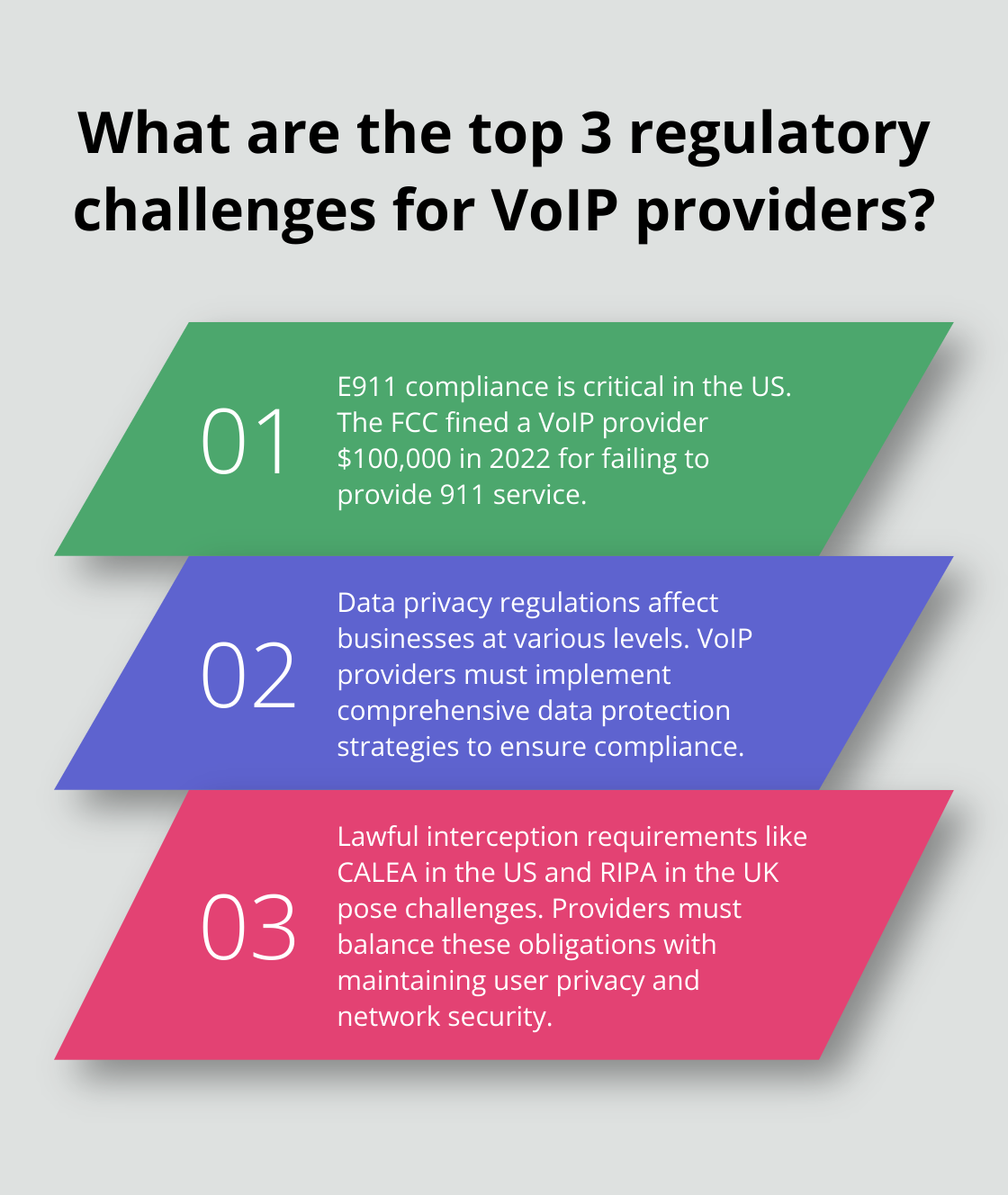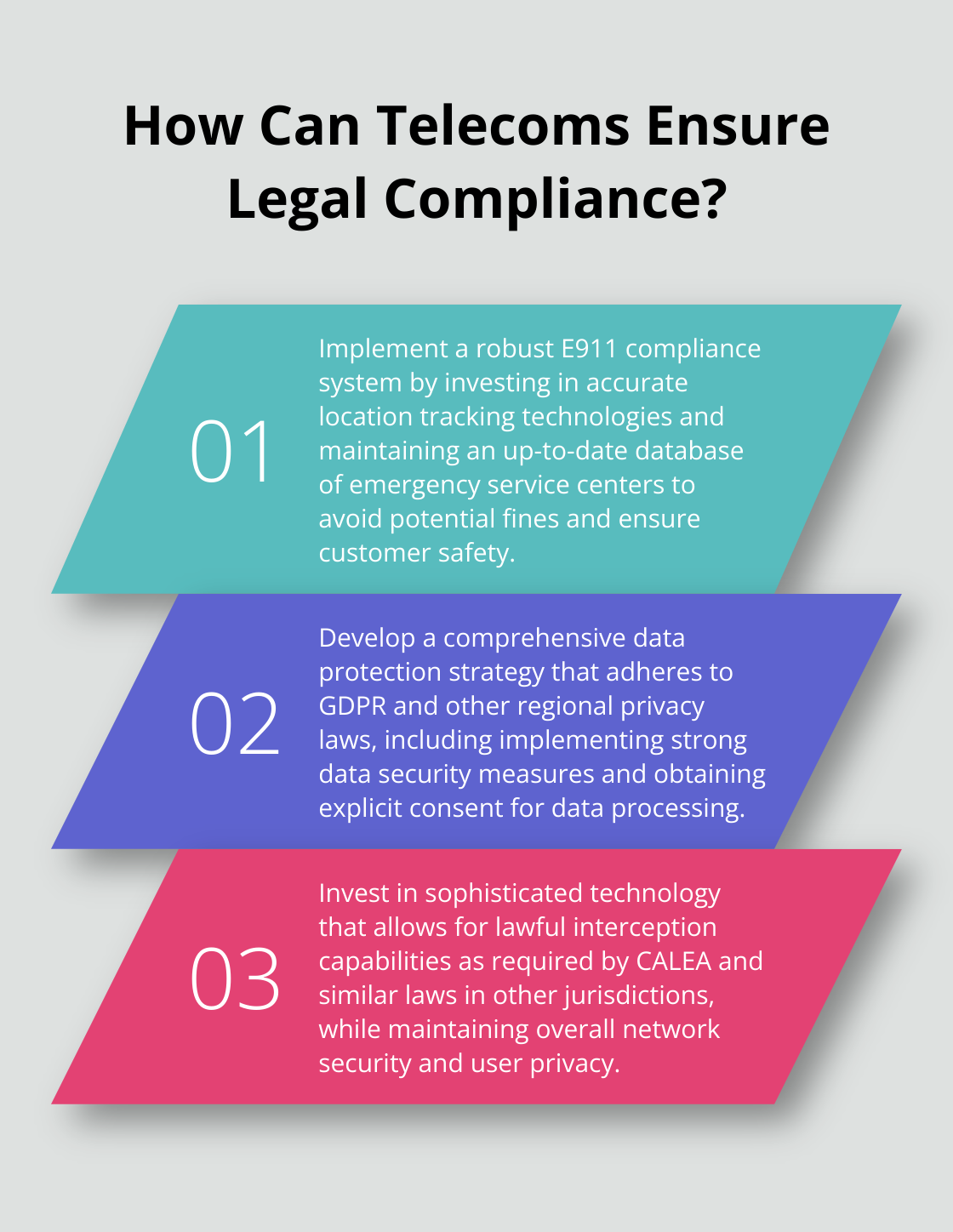VoIP regulations are reshaping the global communications landscape. As businesses expand across borders, understanding and complying with these rules becomes essential.
At UCaaS Review, we’ve seen how navigating the complex web of international VoIP regulations can be challenging for companies. This guide will help you understand the key regulatory issues and strategies for maintaining compliance in different regions.
What Are VoIP Regulations?
The Revolution of Global Communications
VoIP (Voice over Internet Protocol) has transformed global communications, enabling businesses to make calls over the Internet instead of traditional phone lines. This technology offers significant cost savings and increased flexibility for companies worldwide. However, VoIP services must adhere to various regulations across different countries and regions.
The Expanding VoIP Market
The impact of VoIP on global communications is substantial. Allied Market Research projects the global mobile VoIP market to reach $327.5 billion by 2031, growing at a CAGR of 21.1% from $49.23 billion in 2021. This massive growth emphasizes the need for businesses to understand and comply with VoIP regulations, as non-compliance can result in severe penalties and operational disruptions.
The Importance of Regulatory Compliance
In 2022, the Federal Communications Commission (FCC) threatened to remove seven VoIP providers from its trusted database for failing to implement robocall safeguards. This action highlights the serious consequences of non-compliance. Moreover, adhering to regulations helps build trust with customers and partners, as it demonstrates a commitment to data privacy and security.
Key Regulatory Bodies
Several regulatory bodies oversee VoIP services globally:
- United States: The FCC is the primary regulator, imposing strict rules on VoIP providers (including mandatory E911 services and compliance with the Communications Assistance for Law Enforcement Act).
- European Union: The European Electronic Communications Code (EECC) sets the regulatory framework for VoIP services, including adherence to the General Data Protection Regulation (GDPR) for data protection and privacy.
- Asia-Pacific: This region has a varied regulatory landscape, with each country having its own approach. For instance, China requires providers to obtain specific licenses and comply with data localization laws.
The Path Forward
Understanding these regulatory bodies and their requirements is essential for businesses operating across borders. Companies that proactively stay informed about regulatory changes and implement compliance strategies are better positioned to expand their VoIP services globally without legal hurdles.

As we move forward, let’s explore the specific regional VoIP regulatory landscapes in more detail, starting with North America and its unique set of rules and requirements.
How Do VoIP Regulations Differ Globally?
North America: Strict Oversight and Consumer Protection
In North America, particularly the United States, the Federal Communications Commission (FCC) plays a central role in regulating VoIP services. The FCC imposes stringent rules to protect consumers and ensure fair competition. One of the most important requirements is compliance with Enhanced 911 (E911) services, which requires VoIP providers to route emergency calls to the appropriate local emergency service center and provide accurate location information.

The Communications Assistance for Law Enforcement Act (CALEA), also known as the “Digital Telephony Act,” is another key regulation in North America. This law, passed in 1994, requires VoIP providers to include capabilities that allow law enforcement agencies to conduct electronic surveillance when authorized by court order. Compliance with CALEA can be complex and expensive, but it’s non-negotiable for operating in the U.S. market.
In 2022, the FCC took decisive action against seven VoIP providers for failing to implement robocall safeguards, threatening to remove them from its trusted database. This move underscores the importance of adhering to FCC regulations, including implementing STIR/SHAKEN protocols to combat illegal robocalls and spoofing.
European Union: Data Protection and Privacy First
The European Union’s approach to VoIP regulation centers heavily on data protection and privacy. The General Data Protection Regulation (GDPR) sets strict standards for how companies handle personal data, including voice communications. VoIP providers operating in the EU must ensure that their services are GDPR-compliant, which includes implementing robust data security measures and obtaining explicit consent for data processing.
The ePrivacy Directive (often referred to as the Cookie Law) also impacts VoIP services in the EU. While primarily known for regulating website cookies, it also covers electronic communications privacy. VoIP providers must ensure the confidentiality of communications and related traffic data.
Additionally, the European Electronic Communications Code (EECC) establishes a framework for regulating electronic communications networks and services, including VoIP. It aims to promote competition, enhance consumer protection, and ensure universal access to high-speed broadband and communication services.
Asia-Pacific: A Diverse Regulatory Landscape
The Asia-Pacific region presents a more fragmented regulatory environment for VoIP services. Each country has its own approach, making it challenging for businesses to navigate the market as a whole.
In China, VoIP providers must obtain specific licenses and comply with strict data localization laws. This means that certain data must be stored within China’s borders, presenting logistical challenges for international providers.
Japan has a more liberal approach, with relatively few restrictions on VoIP services. However, providers must still register with the Ministry of Internal Affairs and Communications and comply with consumer protection regulations.
Australia has been moving towards a more unified approach. The Australian Communications and Media Authority (ACMA) regulates VoIP services under the Telecommunications Act, requiring providers to meet specific standards for emergency call services and customer information.
Navigating the Global VoIP Regulatory Maze
Given these regional differences, businesses looking to expand their VoIP services globally must adopt a flexible and proactive approach to compliance. This might involve:
- Conducting thorough research on local regulations before entering new markets.
- Implementing robust data protection measures that meet the highest global standards.
- Investing in flexible technology infrastructure that can adapt to different regulatory requirements.
- Partnering with local experts or legal counsel to navigate complex regulatory landscapes.
Businesses that prioritize regulatory compliance from the outset are better positioned to succeed in the global VoIP market. Understanding and respecting regional differences in VoIP regulations allows companies to build trust with customers and avoid costly legal pitfalls.
As we explore the intricacies of global VoIP regulations, it becomes clear that providers face numerous challenges in maintaining compliance across borders. Let’s examine some of the most common regulatory hurdles that VoIP providers must overcome to operate successfully in multiple jurisdictions.
What Are the Biggest VoIP Regulatory Hurdles?
VoIP providers face significant challenges when they navigate the complex landscape of global regulations. These hurdles can determine a company’s ability to operate across borders. Let’s explore the most pressing regulatory issues that VoIP providers must address to ensure compliance and maintain their competitive edge.
E911 Compliance: A Critical Challenge
Emergency services compliance, particularly E911 in the United States, presents a critical hurdle for VoIP providers. The FCC requires VoIP services to provide access to emergency services, including the ability to route calls to the nearest Public Safety Answering Point (PSAP) and provide accurate location information. This requirement proves technically complex and costly to implement, especially for providers operating across multiple jurisdictions.

In 2022, the FCC imposed a $100,000 fine on a VoIP provider for failing to provide 911 service to some of its customers. This action underscores the seriousness with which regulators view E911 compliance. VoIP providers must invest in robust location tracking technologies and maintain up-to-date databases of emergency service centers to meet these requirements.
Data Privacy: Navigating a Complex Maze
Data privacy regulations present another significant challenge for VoIP providers. These laws affect businesses and consumers at various levels, requiring providers to implement comprehensive data protection strategies. VoIP providers must ensure compliance with these regulations to protect user data and avoid potential penalties.
Lawful Interception: A Delicate Balance
Lawful interception and monitoring obligations pose a unique challenge for VoIP providers. In the United States, the Communications Assistance for Law Enforcement Act (CALEA) requires providers to build interception capabilities into their networks. Similar requirements exist in other jurisdictions, such as the Regulation of Investigatory Powers Act (RIPA) in the UK.
Implementing these capabilities while maintaining user privacy and security requires a delicate balance. VoIP providers must invest in sophisticated technology that allows for lawful interception when required by court order, without compromising the overall security of their networks. This often involves significant financial and technical resources.
Staying Ahead of Regulatory Changes
To overcome these regulatory hurdles, VoIP providers must adopt a proactive approach. This includes:
- Continuous monitoring of regulatory changes across different jurisdictions
- Investment in compliance technologies and infrastructure
- Collaboration with legal experts to ensure adherence to all requirements
- Regular staff training on compliance issues and best practices
VoIP providers who successfully address these challenges position themselves to thrive in the growing global VoIP market. They demonstrate their commitment to user safety, data protection, and legal compliance, which in turn builds trust with customers and regulatory bodies alike.
Final Thoughts
VoIP regulations across borders present a complex challenge for businesses today. The regulatory environment varies significantly between regions, with each jurisdiction imposing its own set of rules and requirements. Companies must stay informed about these regulations to maintain legal compliance and gain a strategic advantage in the global market.

We expect VoIP regulations to evolve further, driven by advancements in technology and changing consumer expectations. Future regulations will likely focus on data privacy, cybersecurity, and the integration of emerging technologies like artificial intelligence and the Internet of Things (IoT). Businesses must remain adaptable and ready to adjust their compliance strategies as these trends unfold.
At UCaaS Review, we understand the challenges businesses face when navigating VoIP regulations. Our AI-powered platform helps companies find the best UCaaS providers that meet their specific needs and comply with relevant regulations. Companies can make informed decisions about their communication strategies and prepare for future regulatory challenges by using our extensive database of verified user reviews and unbiased evaluations.



